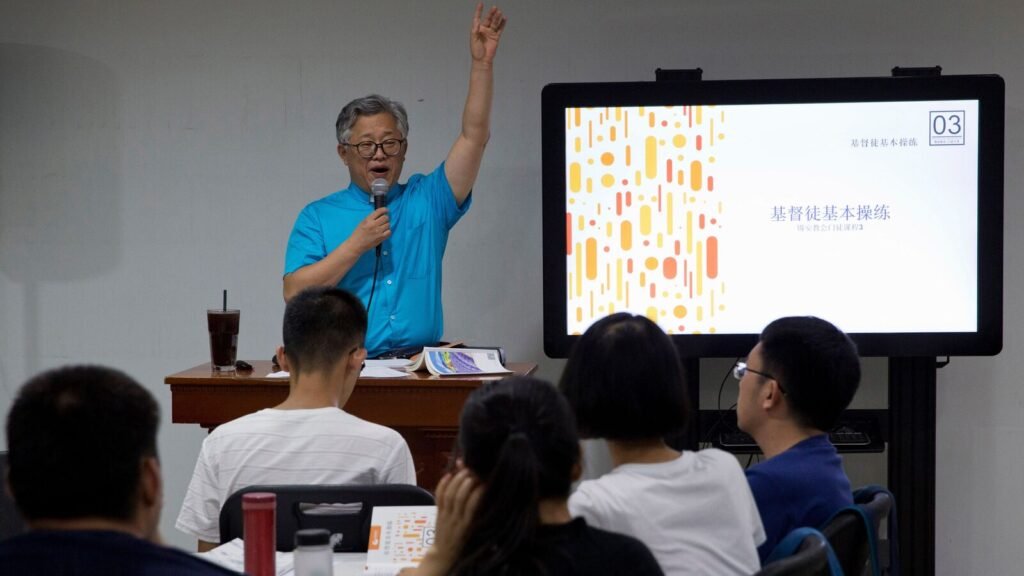Pastor Ezra Jin Mingri, leader of the influential underground Zion Church, was detained Friday evening at his home in Beihai, located in China’s southeastern Guangxi province, according to his daughter, fellow church pastors, and a religious rights monitoring group, as reported by AP.
Dozens of other Zion Church leaders were also reportedly arrested in Beijing and at least five other provinces across the country. Sean Long, a Chinese Zion Church pastor currently based in the U.S., said the detained may face charges related to the “illegal dissemination of religious content via the internet.”
“This is a very disturbing and distressing moment,” Long told The Associated Press by phone. “This is a brutal violation of freedom of religion, which is written into the Chinese constitution. We want our pastors to be released immediately.”
Also Read: The Dalai Lama vs China battle heats up: Beijing says choosing his successor ‘by no means’ an internal religious matter
US Secretary of State Marco Rubio on Sunday condemned China’s detention of several leaders of Zion Church in China. The US called for their immediate release.
In a post on X, Rubio said, “The United States condemns the Chinese Communist Party’s recent detention of dozens of leaders of the unregistered Zion Church in China, including prominent pastor Mingri “Ezra” Jin. We call for their immediate release.”
What is Zion Church?
Zion Church is an underground or house church that is unregistered with the Chinese authorities. They defy Chinese government restrictions requiring believers to worship only in registered congregations.
Founded in 2007 by Pastor Jin Mingri (Ezra Jin), an ethnic Korean who became a Christian after the 1989 Tiananmen Square massacre, the church has grown into a major evangelical force with thousands of followers and a focus on Reformed theology.
Also Read: Pope Francis’s Asia Trip Is All About China
Under Chinese leader Xi Jinping, Beijing has cracked down on independent Christian congregations over the past decade, destroying crosses, burning Bibles, shuttering churches and ordering followers to sign papers renouncing their faith. Chinese authorities have pushed to “Sinicize” religion by demanding loyalty to the officially atheist Communist Party and eliminating any challenge to its power over people’s lives.
Zion Church was among many targeted during a sweeping 2018 crackdown, which led to the closure of its main sanctuary.
According to Pastor Sean Long, the church’s membership has surged from about 1,500 in 2018 to an estimated 5,000 or more today. It now operates more than 100 unofficial worship sites across 40 cities, including in apartments, restaurants, and even karaoke bars.
Why China see ‘underground’ churches as a threat?
Other underground churches in China have also faced increasing pressure in recent months, amid renewed government efforts to control religious activity outside state-approved channels.
Because it refuses to register under the state-controlled Three-Self Patriotic Movement, the Chinese government views Zion Church as a potential threat to Communist Party control. It has faced repeated crackdowns, most notably in 2018 when authorities shut down its Beijing operations, placed Pastor Jin under surveillance, and temporarily prevented his U.S. citizen family members from leaving China.
What is the Three-Self Patriotic Movement (TSPM)?
The Three-Self Patriotic Movement (TSPM) is the state-sanctioned Protestant Christian organisation in China, established in 1954 to regulate and control Protestant churches under the CCP.
Its name derives from three core principles-self-governance, self-support, and self-propagation, which emphasise independence from foreign missionary influence and alignment with Chinese government policies.
Also Read: China enacts sweeping powers to silence Hong Kong’s protesters
It is operated under the National Committee of the TSPM, supervised by the State Administration for Religious Affairs (SARA) and the United Front Work Department.
Zion Church explicitly rejects TSPM oversight to preserve its theological independence, focusing on Reformed theology and uncensored teachings.
‘Zion blew up after COVID’
Jin’s daughter, Grace Jin, who lives in the United States, isn’t certain what prompted this recent crackdown, but she believes it may be because of the Zion Church’s growing influence and challenge to Communist Party rule.
“Zion blew up after COVID, so that irked the government,” she said.
Also Read: China blends religion with AI, launches new weather warning system inspired by sea goddess Mazu
In May, the pastor of Light of Zion Church in Xi’an in eastern China, was detained. In June, ten members of the Golden Lampstand Church in the western province of Shanxi were sentenced to prison after being arrested four years ago.
“We are witnessing the most extensive and coordinated wave of persecution against urban independent house churches in China in over four decades,” said Bob Fu, founder of US-based religious group China Aid, which also reported the Zion Church arrests, as reported by the Associated Press.
In 2021, the US government estimated Buddhists comprise 18.2 per cent of the country’s total population, Christians 5.1 per cent, Muslims 1.8 per cent, followers of folk religions 21.9 per cent, and atheists or unaffiliated persons 52.2 per cent, with Hindus, Jews, and Taoists comprising less than 1 per cent.
Religious freedom in China
China has continued to suppress religious freedom through widespread high-tech surveillance around places of worship and beyond. Authorities have also used advanced technologies for transnational repression and disinformation campaigns aimed at silencing criticism of the country’s human rights abuses.
According to a report by the 2025 USCIRF Annual Report, Chinese authorities threatened Uyghur and Tibetan diaspora communities with surveillance, blackmail, and threats against their families living in China to force them into silence.
Also Read: Manu Joseph: Why faith losing its hold won’t really change the world
Authorities further promoted tourism to Xinjiang to whitewash its genocidal violations there and dismiss international criticism.
Human rights activists continued to express concerns about Hong Kong’s new national security law, Article 23, and its impact on religious freedom. Some imprisoned Hong Kong activists have alleged that prison authorities deny them access to religious materials.




